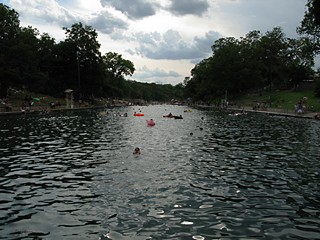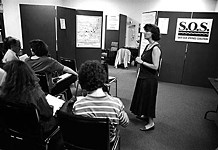Then There's This: Longing for the Future
For better or worse, SOS was a political game-changer
By Amy Smith, Fri., Aug. 3, 2012
A couple of Sundays ago, I stood in the South Austin home of Mark Yznaga and Ann Kitchen and stared, wide-eyed and perplexed, at a vast spread of campaign material that covered every inch of an immense dining table.
I had swung by for what I thought would be a quick pick-up of a few pieces of memorabilia from the 1992 election on the Save Our Springs initiative. (You may have noticed we're observing the 20th anniversary of the ordinance in this issue.) Instead, I was treated to a historical exhibition of every Austin-based political campaign that's taken place from 1992 to the present.
There were mailers, flyers, documents, memos, newspaper ads, clippings, and handwritten notes. I was overwhelmed. What on earth could a 2003 campaign mailer for Brewster McCracken have to do with SOS, I wondered. Or Betty Dunkerley's council run in 2002? Or former Mayor Kirk Watson's run for Texas attorney general the same year?
For this issue of the Chronicle, I had simply wanted to capture an important moment in time, through the eyes of people who were involved with SOS, and offer it up as an explanation to the tens of thousands of people who have moved here since 1992.
Yznaga served as the SOS campaign manager, and has played a role in a number of other campaigns and causes. Trying to explain SOS, he says, is like trying to describe an elephant (as in the old fable about the blind men and the elephant – one holding the tail, another the trunk, and so on, and each piece of the elephant is different from the other). In that respect, SOS means different things to different people, and those varying interpretations often lead to conflicts. Hence the dizzying spread of 20 years' worth of political campaign material on the table – the elephant in the room – with every single candidate promoting their environmental credentials with the endorsements of one or more prominent environmentalists. It's rare when the "environmental community" speaks with one voice on City Council candidates. Conversely, candidates who ride into office as "environmental candidates" seldom fail to disappoint.
In this year's mayoral race, David Butts, another SOS cohort, signed on to work on the re-election campaign of Mayor Lee Leffingwell. Yznaga stayed out of the council campaigns, but he and Kitchen, a former state representative, supported challenger Brigid Shea, who had served as the director of the SOS Coalition that moved the 1992 initiative forward. Both Leffingwell and Shea legitimately claimed strong environmental support, although Leffingwell in recent years has more often voted with the developer-business folks.
Butts agrees that Leffingwell is the go-to man for business. The mayor is a big supporter of both Formula One and Water Treatment Plant No. 4, two of the most divisive – and costly – issues to come along in recent years. His crossover appeal comes by way of his socially progressive stance on other issues. Same goes for Council Member Mike Martinez, who also carried business support in the last election. "You could say that they are both of that same [business] cut, but, compared to the past, they're not," says Butts. "I think they vote wrong on a number of issues, but as far as their general outlook and philosophy, they're nothing like what used to get elected from the business side."
Then We Started Losing
What happened after SOS, he went on, is that the business community changed its strategy and began fielding candidates who would have just enough appeal to attract support from a certain sector of the enviro community. "The type of candidate they used to run generally had something to do with Aqua Fest," he said of the annual event that sank shortly after the SOS movement solidified its power at City Hall. "The political spectrum has moved away from that sort of good-old-boy-insider type of business candidate running for council."
Moreover, in 1999, enviro and business leaders brokered a peace accord resulting in the preservation of thousands of acres of watershed lands and agreed on "smart growth" principles of keeping large developments off the aquifer. The land-preservation deal still holds, but in later years, the keep-off-the-aquifer promise became the "this-land-is-grandfathered-so-agree-to-our-so-called-compromise-deal-or-you'll-get-something-worse" threat. In 2005, Advanced Micro Devices decided that a nice piece of property in the recharge zone of the aquifer would be a great place to build a new campus. In response to AMD's bull-headedness, the "green" council did ... absolutely nothing. To be sure, preserving land, keeping Barton Springs' heart thumping, and wearing the green flag has been key to Austin being the thriving city that it is today. Yet the paranoiac in me believes we've been co-opted by the rich and powerful.
So, was SOS good for Austin?
"A lot of us are scratching our heads over this one," Yznaga said.
I'm sadly dating myself here, but I covered the SOS campaign when I was a staff writer at the Austin Business Journal. I'd only been in Austin for a couple of years, wasn't terribly informed about the local wars, and there I was, assigned to cover a heated election about real estate and the environment. I managed to find a few of my old stories to refresh my memory. (Fun fact: According to the anti-SOS group's campaign finance report filed a month before the election, Karl Rove & Co. had received $30,000 for direct mail services.) Reading through those stories, I'm reminded that the opposition had no idea what it was up against. I didn't actually realize it at the time, but their campaign was lousy and desperate, relying on several messages instead of one. None of them worked.
The business crowd has wised up considerably since then, and in my view, the environmental community has dumbed down, lowered its standards. Today, every go-along-to-get-along candidate with a streak of green is a winner, and any candidate, elected official, or citizen activist who doesn't play along is ostracized and vilified in a very Rovian way.
All of this of course is just one description of the elephant that sprang from SOS. No one believed the elephant would live this long.
Got something to say on the subject? Send a letter to the editor.











